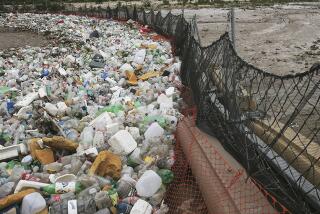Mexico Set for Historic Selloff of Oil Plants : Latin America: The action is part of a government plan offered to creditors in the wake of the peso’s devaluation.
- Share via
MEXICO CITY — Mexico is set to begin a historic selloff of government petrochemical plants with an estimated value of $1.5 billion, Adrian Lajous, general manager of Petroleos Mexicanos, said Thursday.
He said the divestiture of all four major Mexican petrochemical complexes, scheduled to begin in October, will be completed within the next 12 months.
Selling the petrochemical plants is a major component of the plan that the government presented to creditors--principally the U.S. Treasury--for righting public finances in the wake of the December currency devaluation that has reduced the peso’s value by more than 40%.
It is also an important step in a new era of private competition for the government oil monopoly, known as Pemex. That era will also include deregulation of natural gas distribution in 1998, Lajous said in a wide-ranging talk with a small group of reporters.
“Other final products could be liberalized later,” he said, “depending on the success of” natural gas deregulation.
Lajous denied that oil exploration and production operations are likely to be opened to private companies, which have been shut out of the Mexican oil industry since 1938. “The magnitude of the income is too important,” he said.
However, he said, Pemex will continue to contract with private companies for drilling, as it has since 1991. This month, drilling started on development wells in the southern state of Tabasco, the first time Pemex has contracted with a private drilling company for operations on land. All previous contracts were offshore.
“Contracts give us a benchmark,” Lajous said. “We have been able to reduce our time and costs because contractors give us a standard of comparison.”
Pemex had originally planned to start selling off petrochemical plants two years ago but scrapped the idea because a glut of petrochemicals on international markets made offers unacceptably low. With the recovery of petrochemical prices that began in 1994, the government now hopes to receive higher bids.
Some analysts also said the earlier effort failed because the Pemex complexes are too small-scale to be efficient. Lajous acknowledged that some of the oldest plants are problematic because they were built before the industry began putting plants into complexes and that complexes built during the 1960s and ‘70s are small-scale by current standards.
“These are international-scale plants, the international scale when they were built,” he said. “In many of these plants, Pemex has under-invested and not taken advantage of opportunities to improve and update them. Our under-investment is what has made interesting opportunities now.”
Some of that under-investment has included failing to keep up with environmental regulations. A recent audit showed that the four major complexes will need $50 million worth of investment to bring them up to environmental standards. That figure excludes any subsoil problems.
Pemex will make some of the environmental upgrades before selling, Lajous said.
“Anything we do not do will obviously affect the value of the assets,” he said, adding that the four major complexes will be sold individually as complexes. After they are privatized, sales of older, individual plants will begin.
Pemex will at least initially retain a 20% to 33% minority interest in the complexes to help smooth the transition to private ownership, Lajous said.
More to Read
Sign up for Essential California
The most important California stories and recommendations in your inbox every morning.
You may occasionally receive promotional content from the Los Angeles Times.













